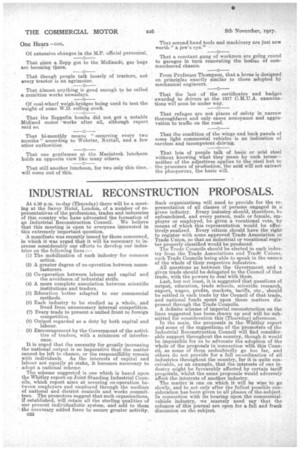INDUSTRIAL RECONSTRUCTION PROPOSALS.
Page 4

If you've noticed an error in this article please click here to report it so we can fix it.
At 4.30 p.m. to-day (Thursday) there will be a meeting at the Savoy Hotel, London, of a, number of representatives of the professions, trades and industries of this country who haee advocated the formation of an Industrial Reconstruction Council. We believe that this meeting is open to everyone interested in this extremely important question.
A manifesto was recently issued by those concerned, in which it was urged that it will be necessary to increase considerably our efforts to develop our industries on the following lines :— (1) The mobilization of each industry for common action.
(2) A greater degree of co-operation between inanufaeturers.
(3) Co-operation between labour and capital and the avoidance, of industrial strife.
(4) A more complete association between scientific institutions and traders.
(5) Education better adapted to our commercial methods.
(6) Each industry to be studied as a whole, and freed from unnecessary internal competition.
(7) Every trade to present a united front to foreign competition.
(8) Output regarded as a duty by both capital and labour.
(9) Encouragement by the Government of the activities of traders, with a minimum of interference.
It is urged that the necessity for greatly increasing the national output is so imperative that the matter cannot be left to chance, or the reeponsiBility remain with individuals. As the interests of capital and labour are equally at stake, it becomes necessary to adopt a national scheme.
The scheme suggested is one which is based upon the Whitley report on Joint Standing Industrial Councils, which report aims at securing co-operation between employers and employed through the medium of national and district councils and works committees. The promoters suggest that such organizations, if established, Will retain all the sterling qualities of our present individualistic system, and add to them the necessary added force to secure greater activity.
022 Such organizations will need to provide for the representation of all classes of persons engaged in a given industry. Every industry should, therefore, be enfranchized, and every person, male or female, employer or employed, be given a vocational vote, by means of which this representation would be effectively realized. Every citizen should have the right to register with some approved Trade Association or Trade Union, so that an industrial or vocational register properly classified would be produced:
The Trade Councils should be elected in eaeh industry from the Trade Associations and Trade Unions, 2uch Trade Councils being able to speak in the riamrs of the whole of their respective industries.
All questions as between the Government and a given trade should be delegated to the Council of that trade, with the powers to deal with them. Last, but not least, it is suggested that questions of output, education, trade schools, scientific research, export, wages, profits, markets, tariffs, etc., should be settled in each trade by the Council of that trade, and national funds spent upon these matters dispensed through the Trade Councils. A definite scheme of imperial reconstruction on the lines suggested has been drawn up and will be submitted for consideration this (Thursday) afternoon.
In the main, the proposals in the Whitley report and 'some of the suggestions of the promoters of the Industrial Reconstruction Council will find considerable support throughout the country, though it would be impossible for us to advocate the adoption of the whole of the proposals in connectionwith this Council, as some of them undoubtedly go too far, and others do not provide for a full co-ordination of all industries throughout the country, for it is quite conceivable, as an example, that the interests of one industry might be favourably affected by certain tariff propoSals, whilst the same proposals would adversely affect the interests of another industry.
The matter is one on which it will bp wise to go slowly, and to act only after the fullest possible consideration has been given to all phases of the subject. In connection with its bearing upon the commercialvehicle industry, we scarcely need say that the columns of this journal are open for a full and frank discussion on the subject.






















